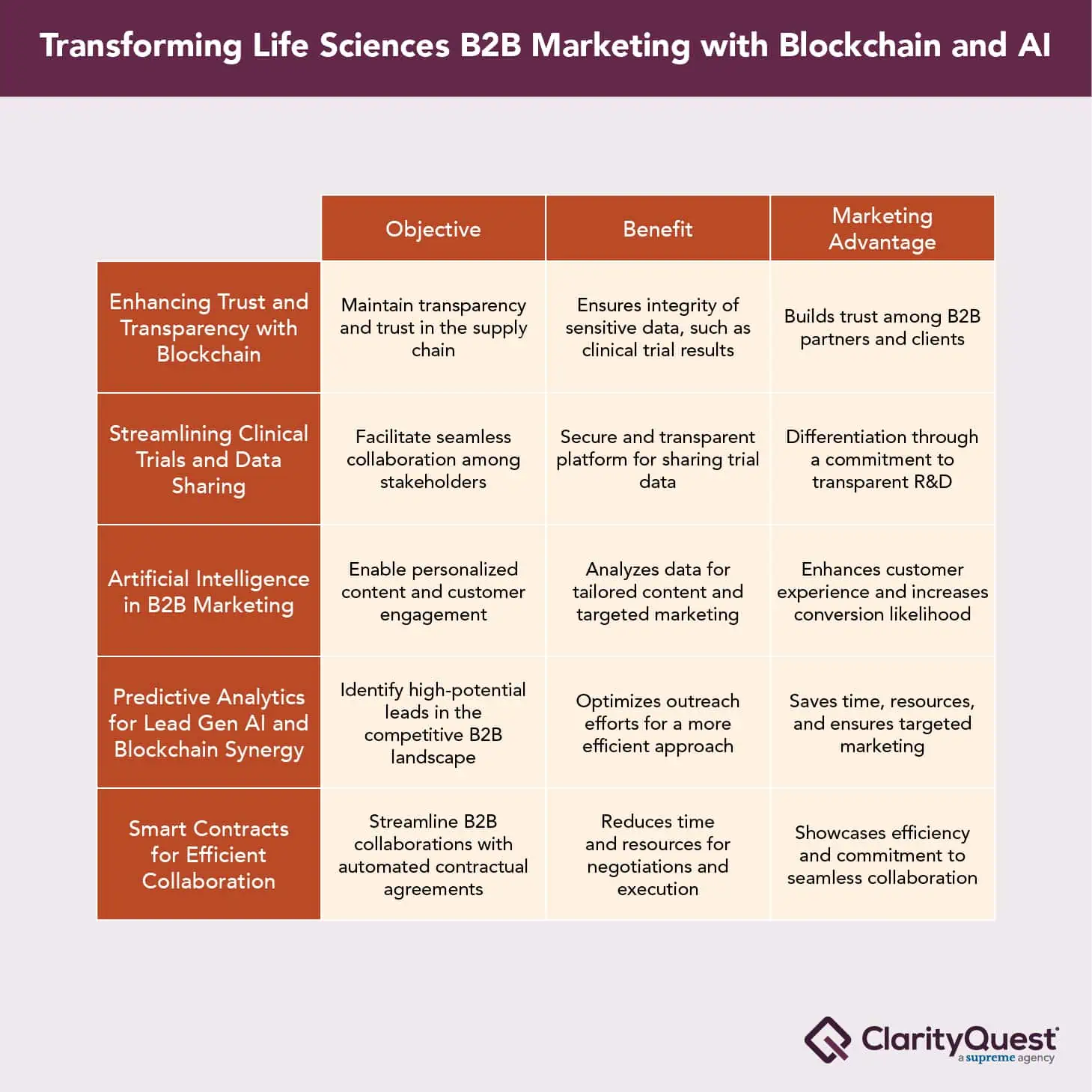Marketing strategies are evolving faster than ever to keep pace with emerging technologies. Among the myriad of advancements, blockchain and artificial intelligence (AI) stand out as transformative forces, reshaping strategies for B2B life sciences and healthcare software marketing.
Let’s dive into the stakes and implications.
Blockchain in healthcare software marketing
Enhancing trust and transparency
Blockchain, originally designed for secure financial transactions, has found a natural fit in the life sciences and healthcare software marketing sector. One of the primary challenges in this industry is maintaining transparency and trust in the supply chain, from drug development to distribution.
Blockchain technology ensures the integrity of data by creating an unchangeable and decentralized ledger. This is particularly crucial when dealing with sensitive information such as clinical trial results, ensuring that data remains unaltered and authentic. In marketing, this transparency can be leveraged to build trust among B2B partners and clients.
Streamlining clinical trials and data sharing
Clinical trials, the backbone of life sciences research, often involve multiple stakeholders. Blockchain facilitates seamless collaboration by providing a secure and transparent platform for sharing trial data among researchers, pharmaceutical companies, and regulatory bodies.
From a marketing perspective, showcasing a commitment to transparency in the research and development phase can be a compelling point of differentiation. Companies can highlight the use of blockchain to ensure the credibility of their clinical trial data, instilling confidence in potential partners and customers.
Artificial intelligence revolutionizes B2B marketing
Personalized content and customer engagement
AI is revolutionizing the way life sciences companies approach B2B marketing by enabling personalized content and customer engagement. Machine learning algorithms analyze vast datasets, helping marketers understand customer preferences and behaviors. This information allows for the creation of tailored content and targeted marketing strategies.
For instance, AI can analyze the browsing history and engagement patterns of a pharmaceutical executive visiting a company’s website. The marketing team can then deliver personalized content, such as whitepapers or case studies, aligning with the executive’s interests and needs. This personalized approach enhances customer experience and increases the likelihood of conversion.
Predictive analytics for lead generation
In the competitive B2B life sciences industry, identifying and reaching out to potential clients is a critical aspect of marketing. AI-driven predictive analytics sift through vast amounts of data to identify patterns and trends, helping marketers identify high-potential leads.
By leveraging AI, life sciences marketers can optimize their outreach efforts, focusing on prospects with a higher likelihood of conversion. This not only saves time and resources but also ensures a more efficient and targeted approach to B2B marketing.
The synergy of blockchain and AI in life sciences marketing
Ensuring data security and privacy
The collaboration of blockchain and AI offers a robust solution for ensuring data security and privacy, critical concerns in the life sciences space. Blockchain’s decentralized nature protects data from unauthorized access or tampering, while AI enhances data security through advanced encryption and authentication processes.
This synergy is particularly relevant in marketing when handling sensitive information about products, research, and partnerships. Companies can highlight the combined power of blockchain and AI in their marketing messages, assuring B2B partners of a secure and privacy-focused collaboration.
Smart contracts for efficient collaboration
Blockchain’s smart contract functionality automates and enforces contractual agreements without the need for intermediaries. In B2B collaborations within the life sciences sector, where partnerships involve complex agreements, smart contracts can streamline processes, reducing the time and resources required for negotiations and execution.
From a healthcare software marketing perspective, showcasing the efficiency of smart contracts in collaboration can be a compelling selling point. Companies can highlight how blockchain technology expedites the onboarding process for new partnerships, demonstrating a commitment to seamless and agile collaboration.
Challenges and considerations
While the potential of blockchain and AI in reshaping life sciences and healthcare software marketing is immense, there are challenges and considerations. Regulatory compliance, industry-wide adoption, and the need for skilled professionals to manage these technologies are hurdles that companies must address.
Regulatory compliance
The life sciences industry operates under stringent regulatory frameworks to ensure the safety and efficacy of products. Implementing blockchain and AI requires compliance with existing regulations and navigating potential challenges in areas such as data privacy and security.
Marketing strategies should communicate a clear understanding of regulatory compliance, reassuring B2B partners that the adoption of these technologies aligns with industry standards and legal requirements.
Industry-wide adoption
The effectiveness of blockchain and AI in B2B marketing is contingent on widespread adoption across the life sciences ecosystem. Companies may face challenges in integrating these technologies if their partners or collaborators have not embraced similar advancements.
In marketing, highlighting a company’s forward-thinking approach and commitment to innovation can mitigate concerns related to industry-wide adoption. Companies should emphasize their role as pioneers in leveraging cutting-edge technologies to stay ahead in the competitive landscape.
Skilled professionals and education
Implementing and managing blockchain and AI technologies require skilled professionals who understand the intricacies of these systems. A shortage of talent in these fields is a common challenge faced by many industries, including life sciences.
Companies can showcase their investment in talent development and training programs. Emphasizing the expertise of their teams in harnessing the power of blockchain and AI sends a message of competence and reliability to potential B2B partners.
Shaping the future of life sciences marketing
As life sciences companies navigate the evolving nature of B2B marketing, the integration of blockchain and AI emerges as a transformative strategy. The combined power of these technologies enhances transparency, ensures data security, and revolutionizes customer engagement.
Companies that effectively communicate the benefits of blockchain and AI adoption position themselves as industry leaders, fostering trust and attracting like-minded partners. As these technologies continue to mature, their impact on reshaping life sciences marketing strategies is set to accelerate, ushering in a new era of innovation and collaboration in the industry.



